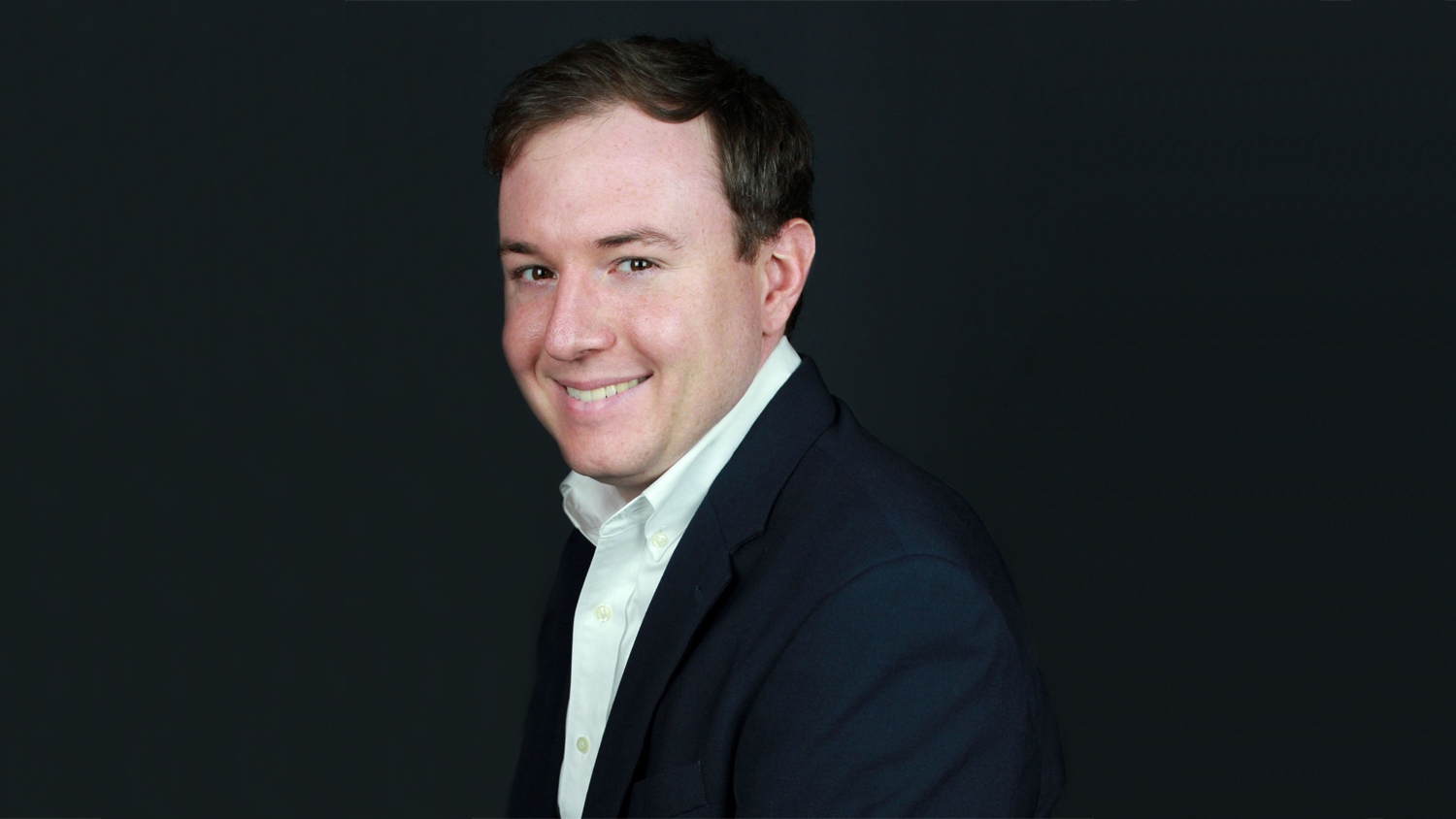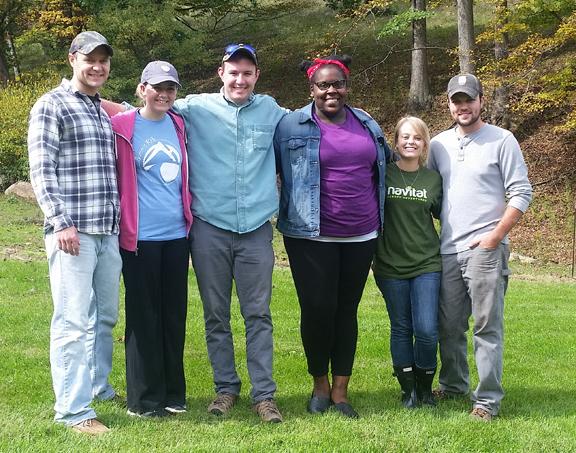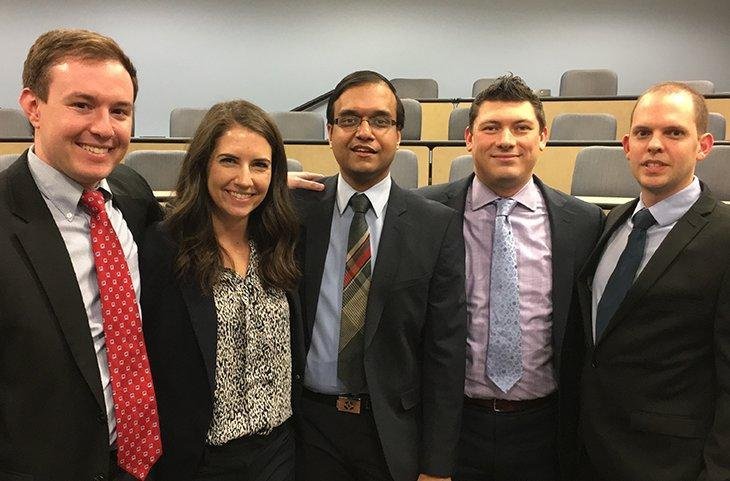Graham Givens MBA’17: Leveraging the Power of the Supply Chain for a More Sustainable Future

Graham Givens is a purpose-driven Jenkins MBA supply chain alum with a passion for creating a more sustainable future.
Givens graduated from NC State with his MBA in supply chain management in 2017, and is now the Sustainability Manager at Foodbuy, North America’s largest food service procurement organization, where he manages corporate social responsibility reporting, compliance and development. During his time as an MBA student, he was an SCRC Supply Chain Scholar with North Carolina Growing Together (NCGT), a USDA-funded project led by the Center for Environmental Farming Systems (CEFS), and worked on several projects to improve supply chain processes for the purpose of improved sustainability for a variety of organizations and professionals.
In this interview, Givens recounts his unique experiences as an MBA supply chain student, and how he’s applied those experiences to his current profession and passion for improving sustainability across supply chains.
Q: You received your undergraduate degree from the University of Mary Washington where you studied environmental science and sociology. How did you transition from this area of focus to getting involved with supply chain management?
A: Well, that’s an interesting story. I went in to undergrad wanting to do something around environmental protection — environmental law, specifically. I went through my undergraduate degree and was gearing up to take the LSAT, and ultimately just really didn’t see a future in being a lawyer. So I made the pivot to focus on policy and advocacy, and worked for a couple years in the non-profit sector. I quickly noticed that a lot of the businesses I was working with were making significant environmental improvements through the products and services they provided, so I thought, “Well, maybe policy is not the best place to make an environmental impact, and business is.” So I left working in policy and advocacy and started working at the Center for Environmental Farming Systems (CEFS) at NC State, where I began to understand what it takes to be sustainable in the agriculture field. I worked on their research farm and in an administrative role and discovered that — since I don’t have a green thumb and I’m not going to be a farmer — I could make an impact by finding ways to better connect our farmers and consumers. This led me to the field of supply chain management and I started working to understand how we can improve these connections in a way that’s efficient, that makes financial sense for both parties, but also effectively shares the story of what the farmers are doing to cultivate their crops or animals. I found that it’s important for the other parts of the supply chain — especially the consumers — to know those stories.
Q: So how did your new involvement and focus on the supply chain lead in to your decision to come to NC State for your MBA?
A: It was mainly through my involvement with CEFS and their affiliation with NC State. It was an opportunity to go back to school while also continuing to work with CEFS, and overall, learning more about what it takes to connect consumers with producers.
Also, it just made logical sense. I had worked in the non-profit sector for a while, and I needed a good way to pivot out of that sector into the corporate world, and so an MBA seemed like a good next step in my career.
Q: Can you describe your experience as a Supply Chain Scholar with the SCRC?
A: I worked with CEFS throughout my time as a student — I completed numerous practicum projects with the organization in addition to being an SCRC Supply Scholar with a CEFS program called North Carolina Growing Together. Overall, it was great to be able to continue being a part of that community and industry.
What probably made my student experience most unique was the work I did during my second and third semesters, when I organized a food conference around sustainable food systems with one of my fellow MBA students, Shannon O’Shea. It was an amazing experience but definitely very hectic, as you can imagine — trying to put together a conference while in business school. The conference — called FoodCon 2016 —was a full-day event, and we had two keynote sessions as well as panel sessions throughout the day. We ended up raising over $15,000 and had over 300 people attend. So overall, it was very successful, and that was a big part of my work as a scholar. It was a bit different, I’m sure, than most students’ experiences, since I wasn’t working directly with a company on a project, but it was more about supporting the sustainable food industry by bringing together experts, students, and people in the field to discuss important topics in the industry.
Q: You also worked on a practicum project with a student team during your first semester. Can you describe that experience and what you were able to accomplish for your sponsor company?
A: That project was centered on first understanding the dairy industry and then working directly with a dairy farmer to understand how we could support their business.
Our main project was to create a financial tool to assist dairy farmers in organizing their current costs and projecting their future costs and sales over the course of five years after their transition. We also created an instructional video and written instructions to assist farmers in operating the tool.
We developed and applied this tool with Austin Dairy Family Farm, a local dairy provider outside of Asheville, who was interested in finding ways to produce and market their own milk. We used our financial tool and market research to try and help them understand how they could grow their dairy operations to increase the amount of milk they produced while also producing and selling their own milk in a way that differentiated them from other milk providers.

Q: Do you know if the dairy farm was able to utilize your team’s findings?
A: I think it definitely gave them a better understanding of what it would take to grow and develop their own brand. Though we were never able to follow back up with the farm and see the result, the tool our team produced is still available for farmers to use to better understand their future.
When we finished our project, it was great to see that our team’s hard work was acknowledged during the SCRC poster competition, where our project poster won first place. Overall, it was a great learning experience for everyone on the team and I think we all found the work very rewarding.
Q: It sounds like you were very busy during your time as a student! Were there any other major projects or accomplishments you were involved with during those two years?
A: Yea, that’s what you’ve got to do in business school — take full advantage of it!
But yes, I was also a part of the first-ever MBA team from State to get invited to the Invest for Impact Competition at the Kenan-Flager Business School at UNC, where we competed against other business school teams from across the country. We were tasked with evaluating the merits of entrepreneurs and their business plans, and deciding which ones to invest in based on their presentations. It was a great experience. We got second place.
Read more about Graham’s Invest for Impact Competition experience here.

Q: So with all those experiences, what did find most valuable about your time as an MBA student at NC State?
A: For me, it was basically the ability to create my own MBA experience. That’s the beauty of NC State — there’s a lot of opportunities to pursue your own interests and apply what you’re learning in the classroom to those interests, and then having the ability to implement it all in the real world through practicum projects and internships. So that was, for me, probably the biggest benefit of getting my MBA at NC State — really being able to focus on what I wanted to do with my career.
[marketing-quote color=’blue’ quotes=’true’ align=’center’]That’s the beauty of NC State — there’s a lot of opportunities to pursue your own interests and apply what you’re learning in the classroom to those interests…[/marketing-quote]
Q: How did your time at NC State play a role in acquiring your current position at Foodbuy?
A: Interestingly enough, one of the members on the CEFS board worked for Compass Group, the company that owns Foodbuy. She was actually one of our keynote speakers at FoodCon, so I had met her and spoke with her about my interests in sustainable food systems and sustainable food supply chains. She told me, “You should really look at Foodbuy — I think they’d be a good opportunity for you to grow in this field.” And to be honest, I hadn’t heard of Foodbuy or Compass Group up until that point, so through her I was really able to learn more about the company and their opportunities to make an impact in the industry. So when a position came up at Foodbuy to support their customer’s needs around sustainability, it was really just a perfect fit.
Q: Can you describe a little bit about what you do there now in your current role?
A: I oversee sustainability for Foodbuy, and my role is basically three-fold: first and foremost, I verify our suppliers and ensure their products meet our customer’s sustainability specifications and criteria. Secondly, I manage and oversee all sustainability reporting for our customers and use that reporting to drive compliance towards their sustainability criteria. And then third, I serve as a project manager to help support any future developments by our customers in concerns with sustainability. Much of my role is helping guide both our internal teams and external partners towards more sustainable solutions that make the most business sense.
Q: How have you applied your experiences at NC State to what you do in your current role?
A: Basically, I’ve taken the skill set that I acquired in business school and applied it to my day-to-day tasks. Through the MBA program and the SCRC, I was really able to gain a lot of knowledge and understanding of how to interact with and gather the types of information I need for the types of projects I work on. When it comes to what’s relative to our customers and what’s relative to the business, I learned that you really have to dig in and say, “Okay, what’s the need here?” And, “How does the data and information that I’m gathering relate back to that need?” I did that throughout business school on all the projects I worked on — they all involved taking a large amount of data, breaking it down, and synthesizing it, and then using it to create opportunities and guide future direction. And so I think that’s the best way in which the skill set I acquired has supported my current role.
For a more in-depth look at Graham’s takeaways from his time as a Jenkins MBA supply chain student, click here.
- Categories: